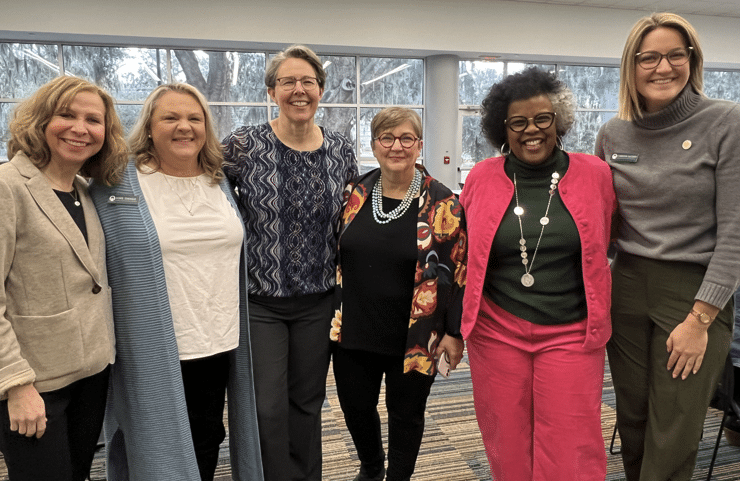National Early Language and Literacy Expert Trains Savannah Educators and Leaders on Critical Literacy Skills for Young Learners
Print This Post
(L-R) Arianne Weldon, director, Get Georgia Reading Campaign, Deal Center for Early Language and Literacy at Georgia College & State University; Jamie Thomas, Early Language Professional Development specialist, Deal Center for Early Language and Literacy at Georgia College & State University; Emily Rubin, director, Communication Crossroads, Inc.; Lizann Roberts, executive director, Coastal Georgia Indicators Coalition; Bernadette Ball-Oliver, executive director of Middle Schools, Savannah-Chatham County Public School System; Caroline Lacksen, Early Literacy Professional Development specialist, Sandra Dunagan Deal Center for Early Language and Literacy at Georgia College & State University.
March 7, 2024 – Learning early language skills helps children make social and emotional connections and affects their ability to communicate, engage socially and regulate emotions.
Developing this skill in young learners is one of the Savannah area’s biggest challenges, according to the Coastal Georgia Indicators Coalition (CGIC), a Georgia Family Connection Collaborative that brings together resource agencies in Savannah that address overall health and well-being while leveraging resource initiatives. The Coalition has determined that the community must seek opportunities to work alongside the school system in improving early language skill development to foster more positive life skills.
On Jan. 11, the CGCI hosted 84 local leaders and educators who work with Savannah area Pre-K and Kindergarten-aged children for a training session with national early language and literacy expert, Emily Rubin.
Presented by Coastal Georgia Indicators Collation, United Way of the Coastal Empire and the Savannah Chatham County Public School System, the all-day event held at the Southwest Branch of Live Oak Public Libraries provided a tool kit for educators to help to identify early indicators of language and how to interact with children to help with their communications.
“I’m passionate about the relationship between engagement and language development. Did you know that when you’re interacting with children, you are producing this awesome chemical called oxytocin? When you produce it, it actually triggers oxytocin in the child. This is an incredible hormone that breaks through the blood-brain barrier and gets children to grow their brains and develop their language. It’s one of the reasons why it’s so exhausting interacting with children because we’re doing all that – but boy, did we know that we are brain architects!” Rubin said.
According to the National Institutes of Health, the first three years of life, when the brain is developing and maturing, are the most intensive period for acquiring speech and language skills. The NIH says these skills develop best in a world that is rich with sounds, sights, and consistent exposure to the speech and language of others.
“This training opportunity gave us the platform we need to engage a wider audience within the community,” said CGIC Executive Director Lizann Roberts. “It shines a light on the importance of language skills in a child’s overall development while also providing educators with the tools they need to help young learners who may be struggling with language development.”
Read the story on savannahbusinessjournal.com.
Contact:
Krystin Dean
GaFCP Communications Specialist
706-897-4711
krystin@gafcp.org
Follow us on Twitter: @gafcpnews.
Connect with us on Facebook.
